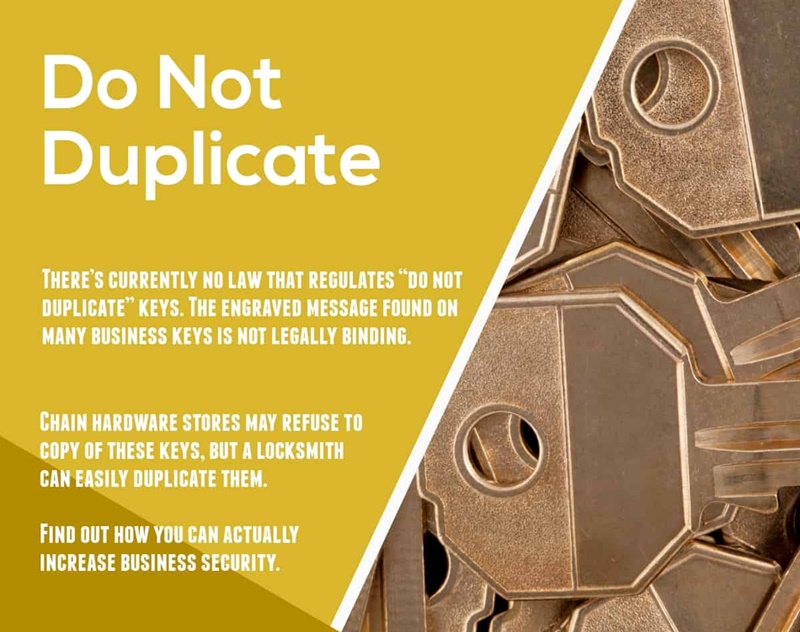Will a Locksmith Copy a “Do Not Duplicate” Key?
Have you ever needed to copy a key but noticed the “DO NOT DUPLICATE” inscription? You probably wondered if it is illegal to duplicate the key.
There’s no law regarding “do not duplicate” keys. The engraved message on many business keys is not legally binding – it’s just a recommendation. Though many chain hardware stores, such as Ace, may refuse to cut a copy of these keys, a locksmith can easily duplicate them.
Now, you’re probably wondering, ‘Why are some keys marked “do not duplicate”?’ and, ‘If a locksmith can copy them, are they any more secure than non-marked keys?’
Table of Contents
Keys Marked “Do Not Duplicate” Don’t Increase Security
Property owners and managers began pressing the “do not duplicate” key message to control security violations from terminated employees, former tenants, construction workers, and others who gain possession of a key. Unauthorized key duplication remains a serious threat to security today and is currently the most violated security policy in business.
The inscription may decrease the number of copies in circulation because of the need to have them copied by a locksmith. Yet, keys stamped with “Do Not Duplicate” are no more secure than keys without. According to the Associated Locksmiths of America (ALOA), having a “do not duplicate” message inscribed on your company keys may provide a false sense of security.

For “Do Not Duplicate” Keys, The Associated Locksmiths of America Advises:
The Associated Locksmiths of America (ALOA) says, “Orders for keys stamped ‘Do Not Duplicate’ or similar wording will be handled like any unrestricted key. ALOA members should inform the consumer that using keys stamped ‘Do Not Duplicate’ or similar wording is ineffective security. Using such words is deceptive because it provides a false sense of security. Consumers who desire effective security should purchase a patented key control system rather than rely on a ‘Do Not Duplicate’ marking. This does not apply to keys protected by law.”
The good news is that some other types of keys are available that can help ensure the security of your business.
Restricted Keys
It is illegal to duplicate some keys. Locksmiths refer to these keys as “restricted,” meaning that duplication rights are limited to the original manufacturer. To make some of their products more secure, lock makers have made restricted keys easier to copy because the process requires special equipment, and the key design is patent-protected.
Restricted keys are covered by U.S. patent laws, which protect manufacturers of specialized lock and key systems. There can be a penalty of up to $10,000 imparted for circumventing the law, including the illegal duplication of restricted keys.
Duplication of restricted keys is limited to approved manufacturers and locksmiths and requires particular tools. To have a copy made, the locksmith should ask for the identification of the person requesting it and proof that this person has obtained permission from the original owner.
These keys provide a higher level of security than unrestricted keys, even those stamped “do not duplicate” because they are more difficult to copy. A restricted key may be the right choice for businesses aiming to control the number of copies available.
Measures for Increasing Business Security
If you suspect that duplicate keys are undermining your organization’s security, consider asking a qualified locksmith to rekey the locks on the property. During rekeying, the locksmith changes the internal mechanism that accepts the keys, making it impossible for the previous keys to work and open the lock.
Another way to provide extra protection for a commercial property is to invest in locks that are more difficult to pick. Some manufacturers produce locks with tight tolerances, additional pins, or special features on the pins – including dimples and angles. Locks should also be made of high-strength materials to prevent burglars or vandals from drilling or breaking them with force. Check with the manufacturer if you are unsure what your locks are made of or how they are designed.
For superior security, it’s recommended to implement a technological solution, such as smart electronic locks. These special devices allow you to lock and unlock doors, program the security system, and even monitor traffic in and out of the building – all from your smartphone. Another great option is electronic access control systems; key card systems allow businesses to restrict certain areas or terminate access to some without needing to reissue cards for other employees.

